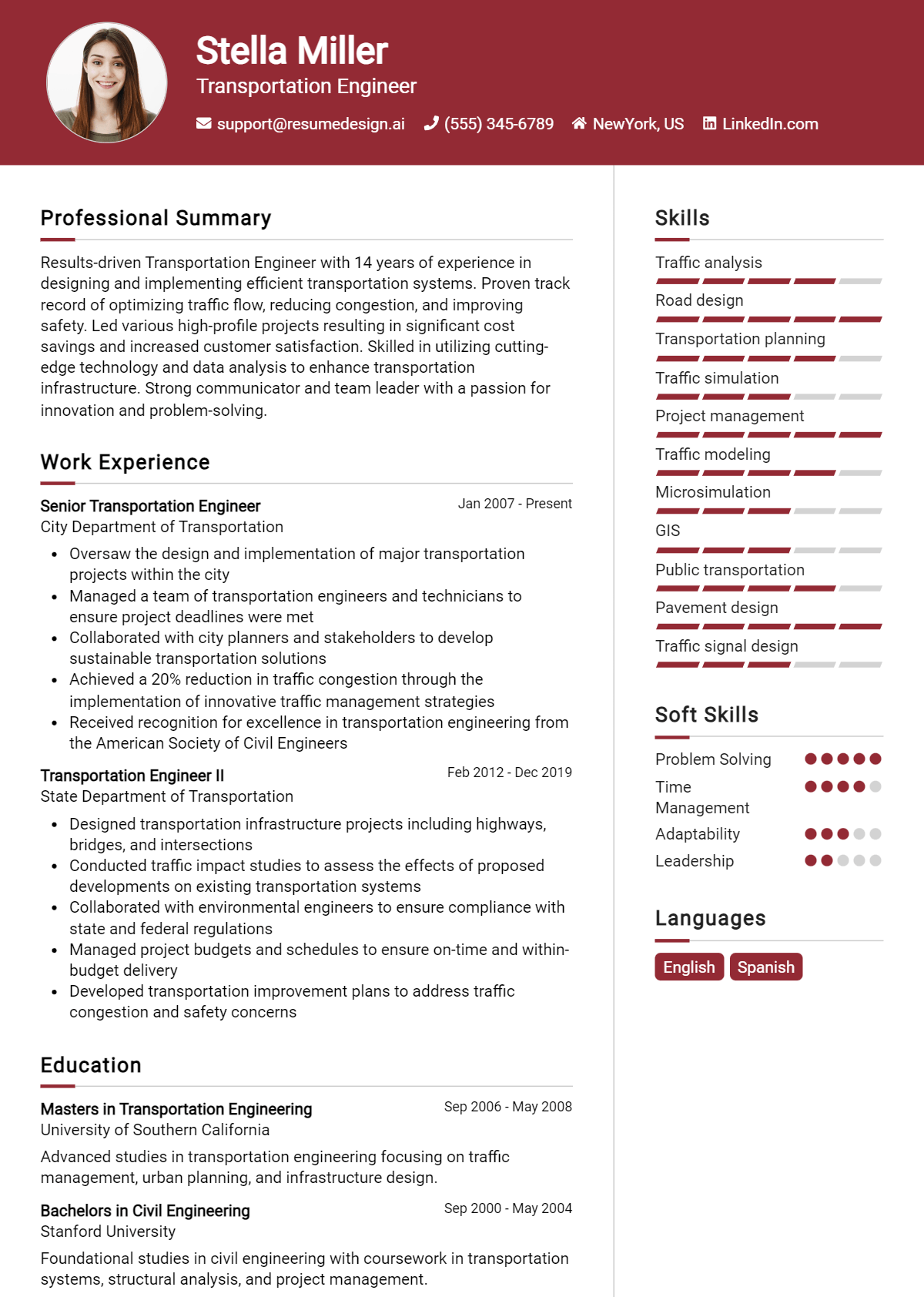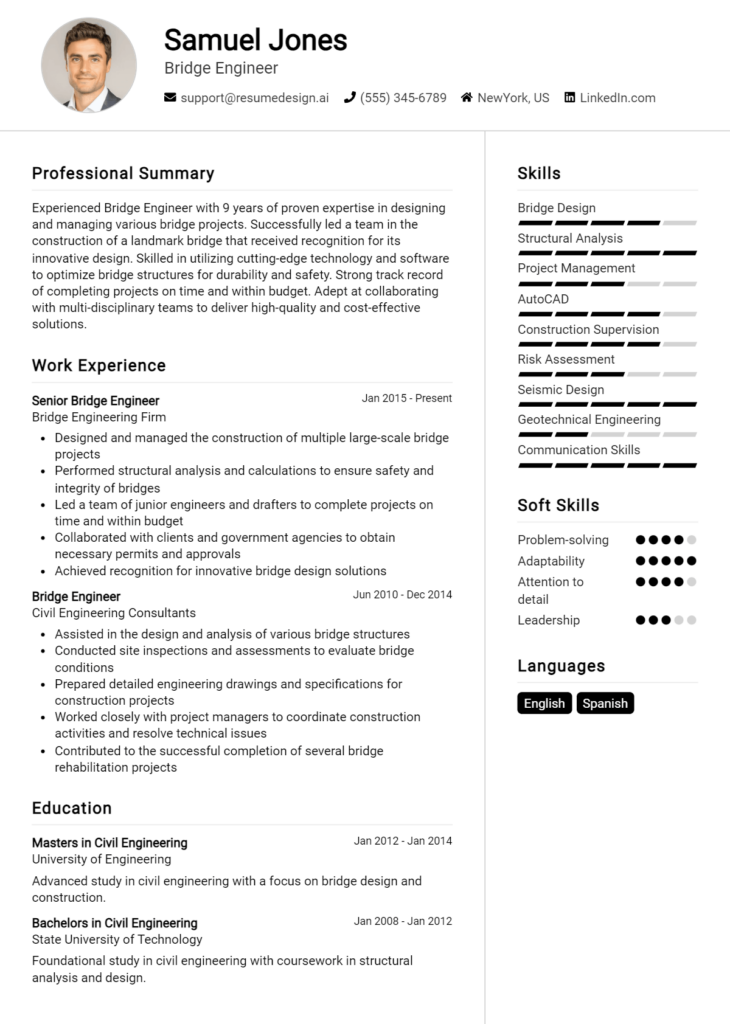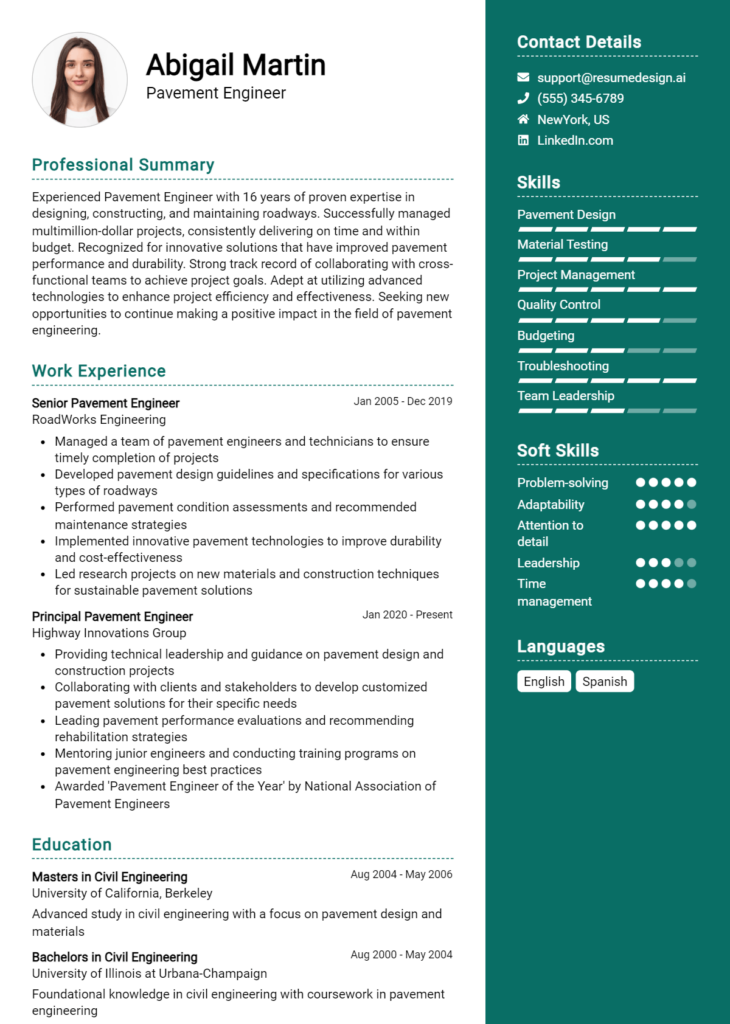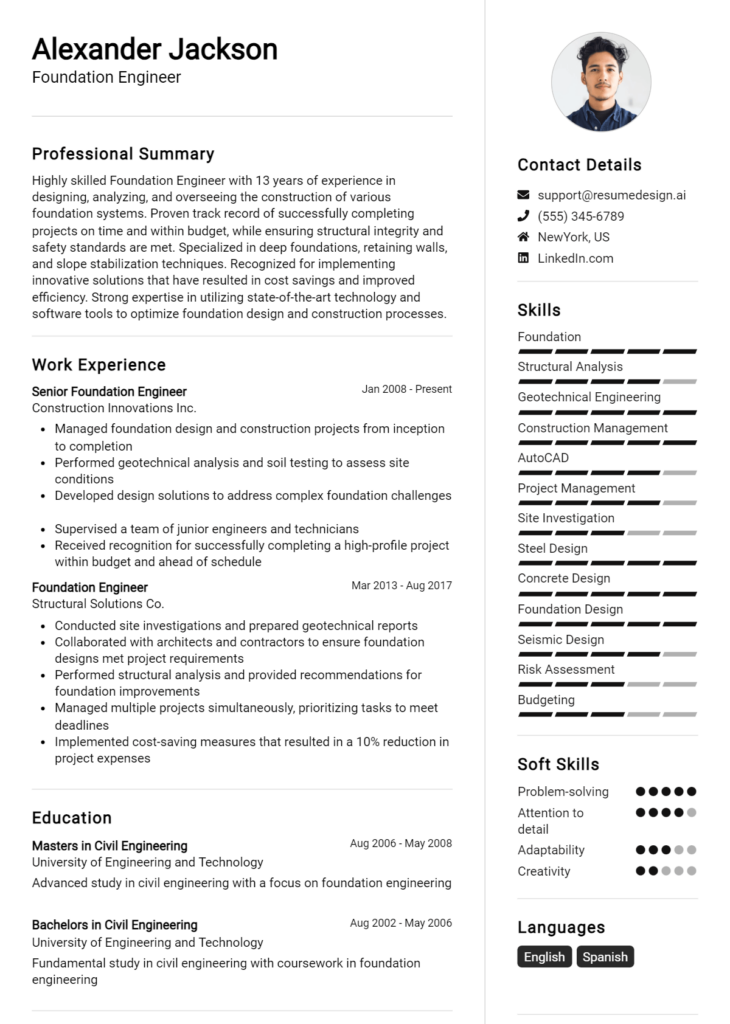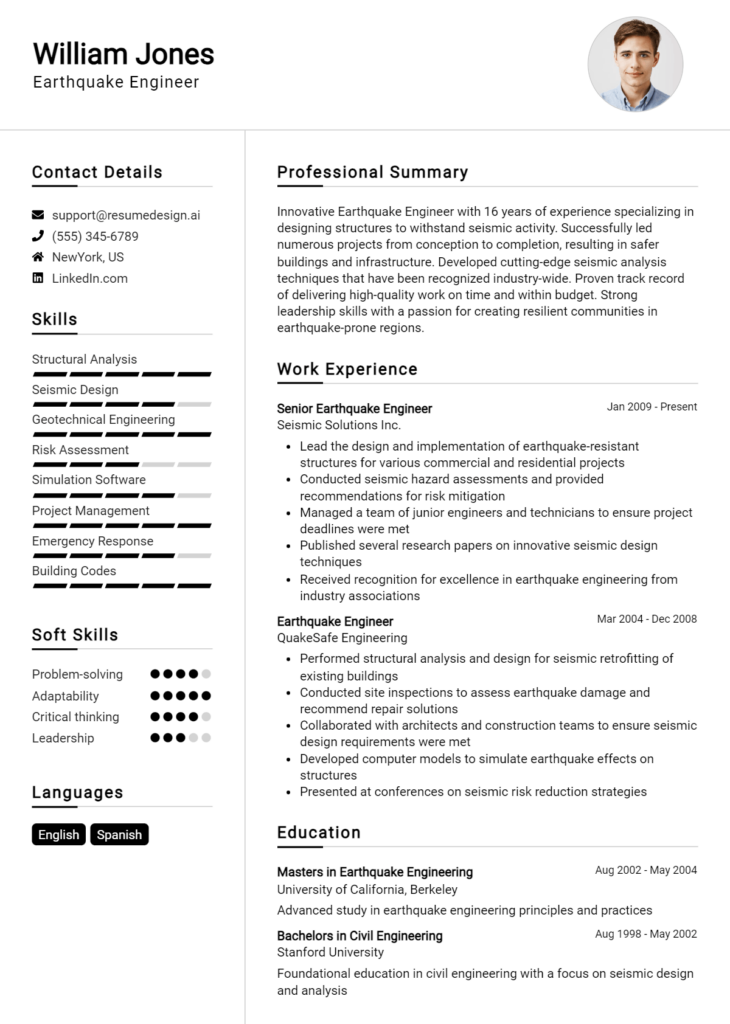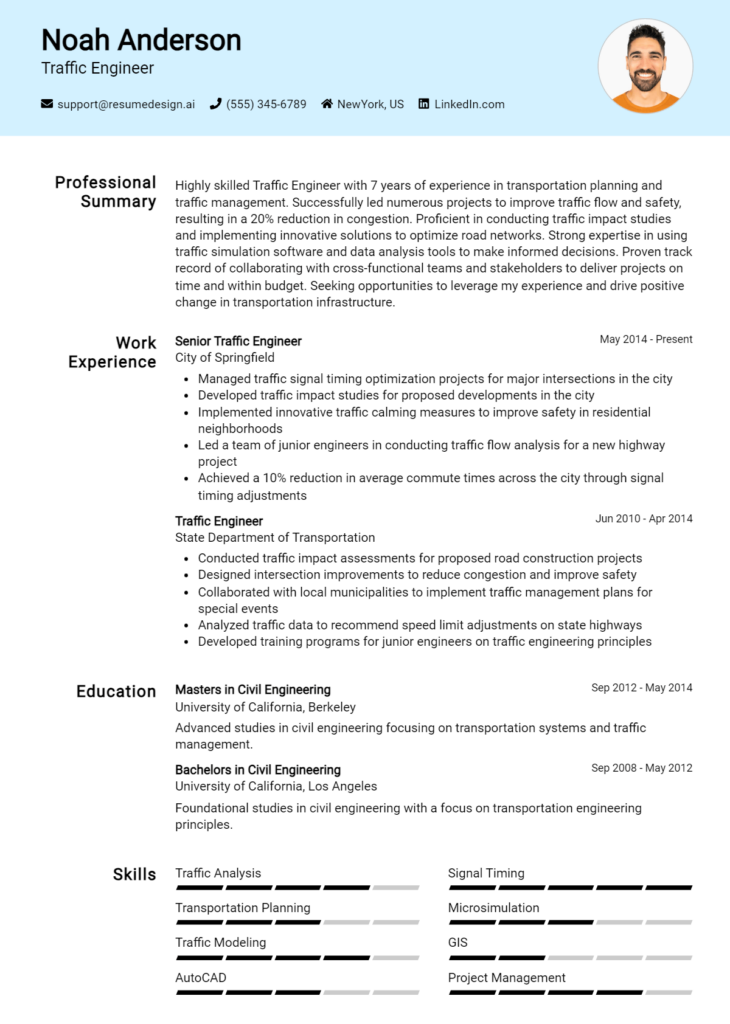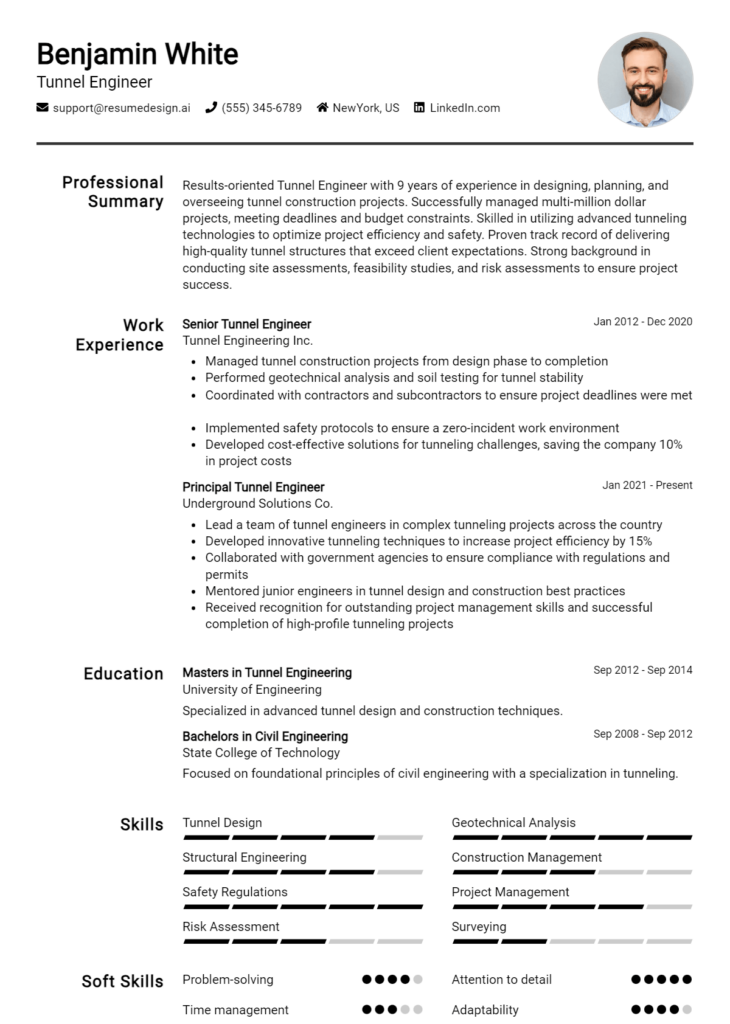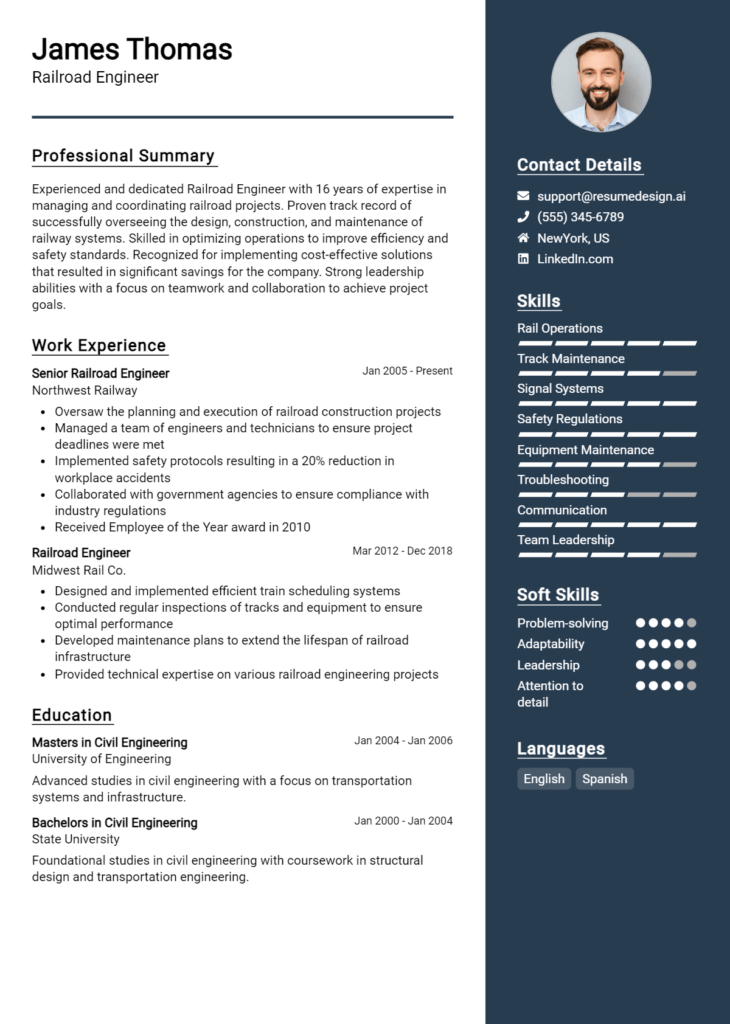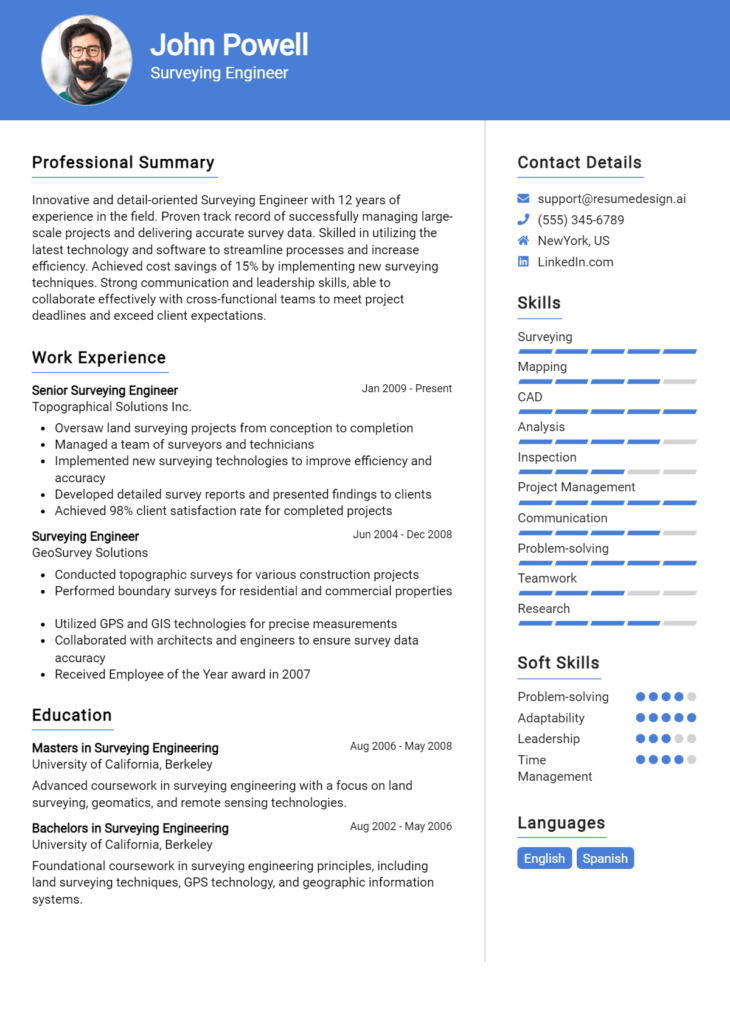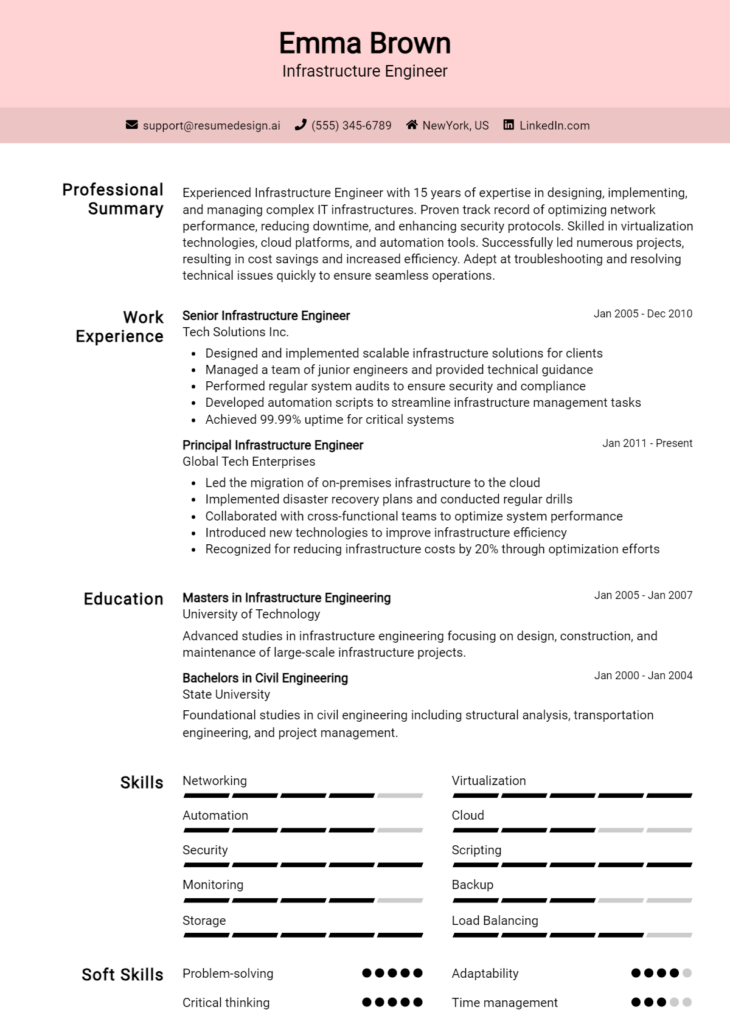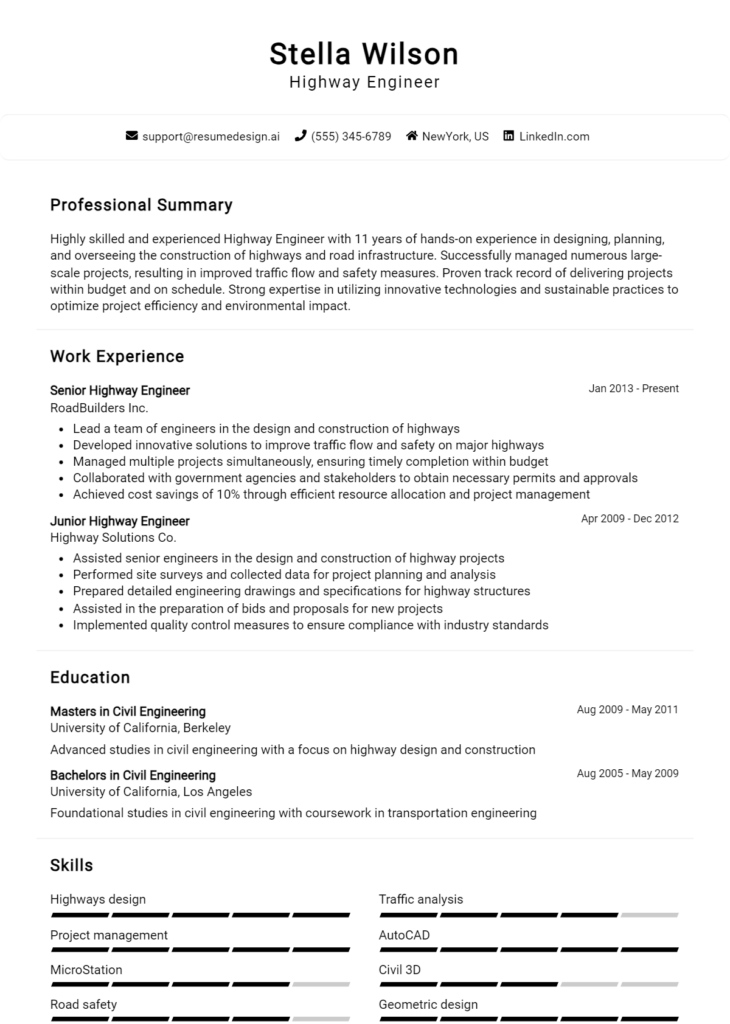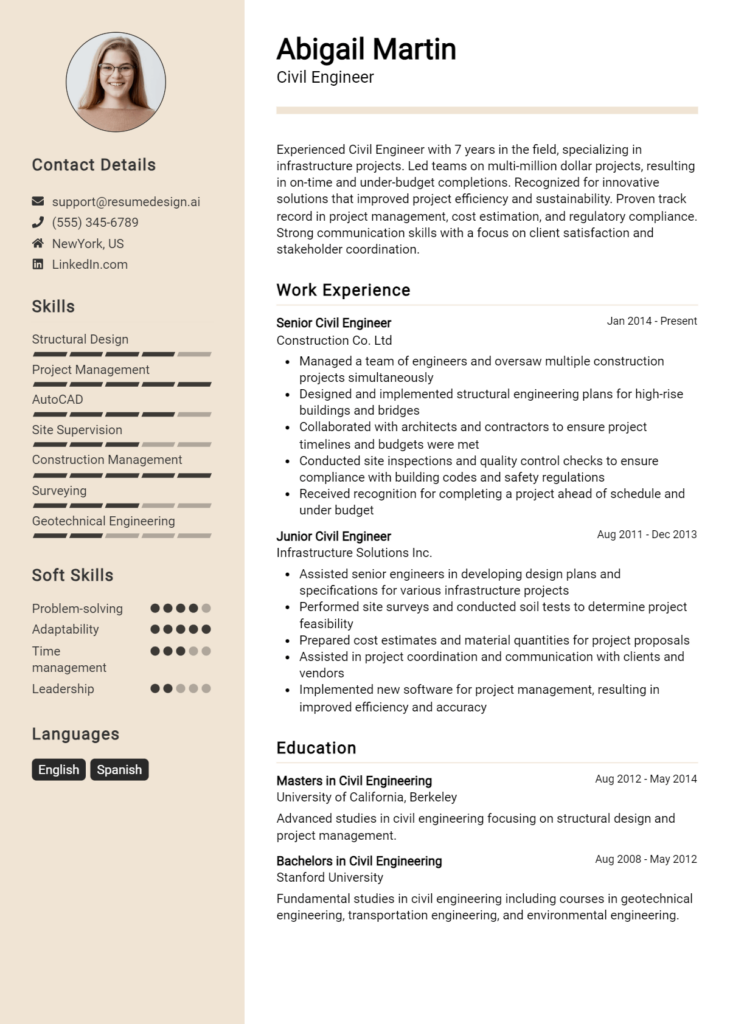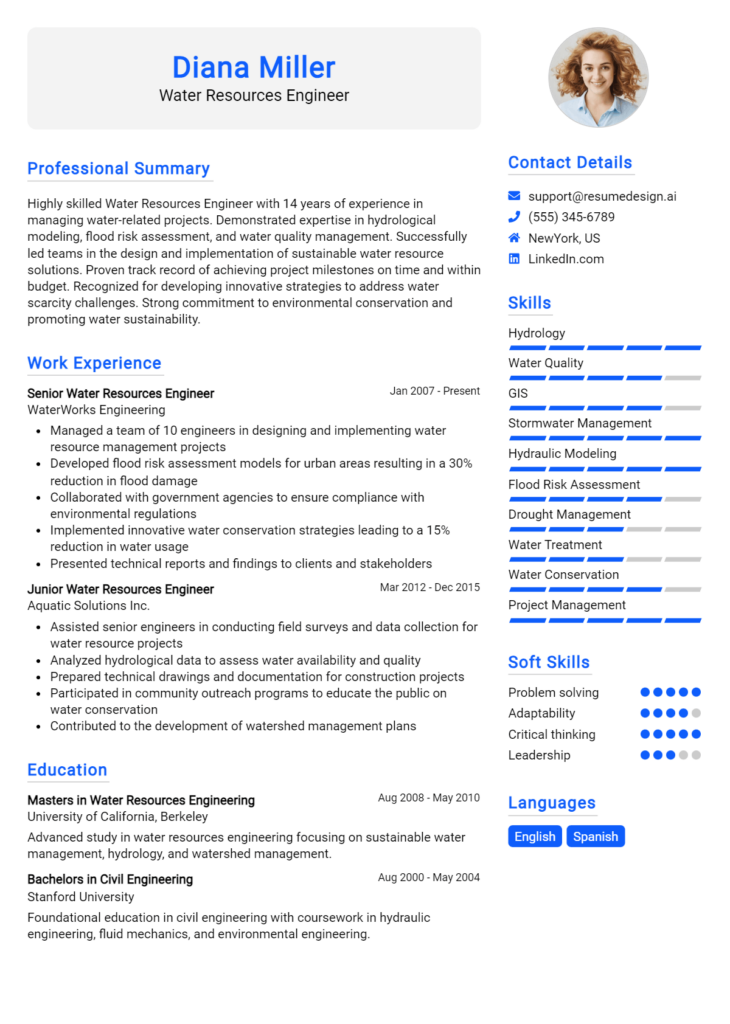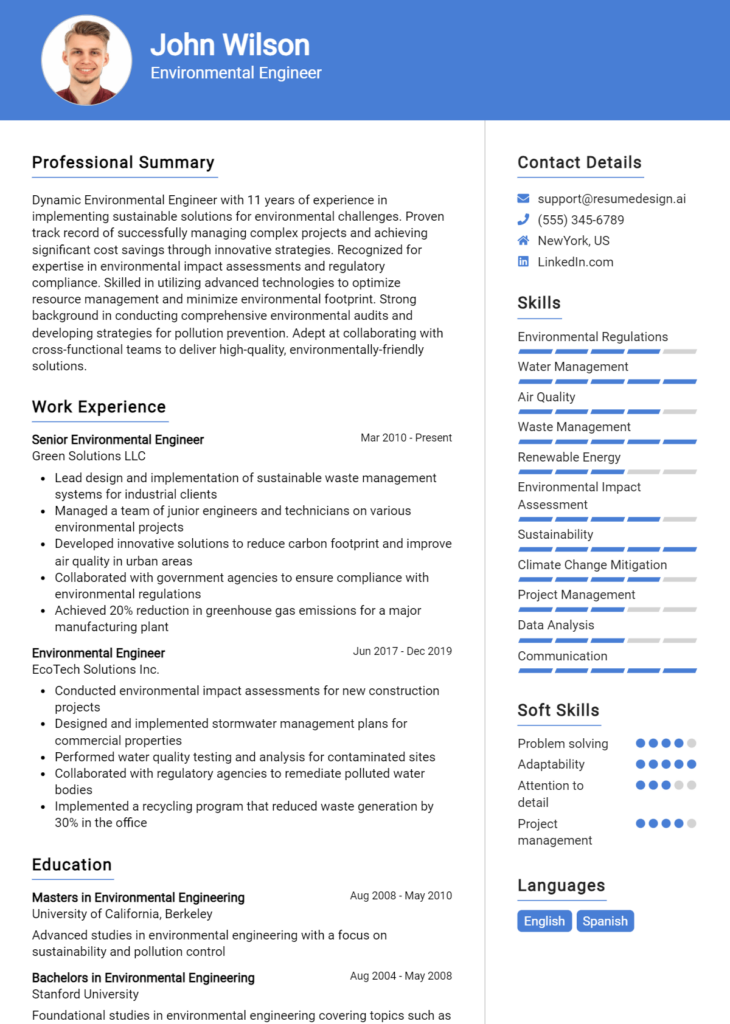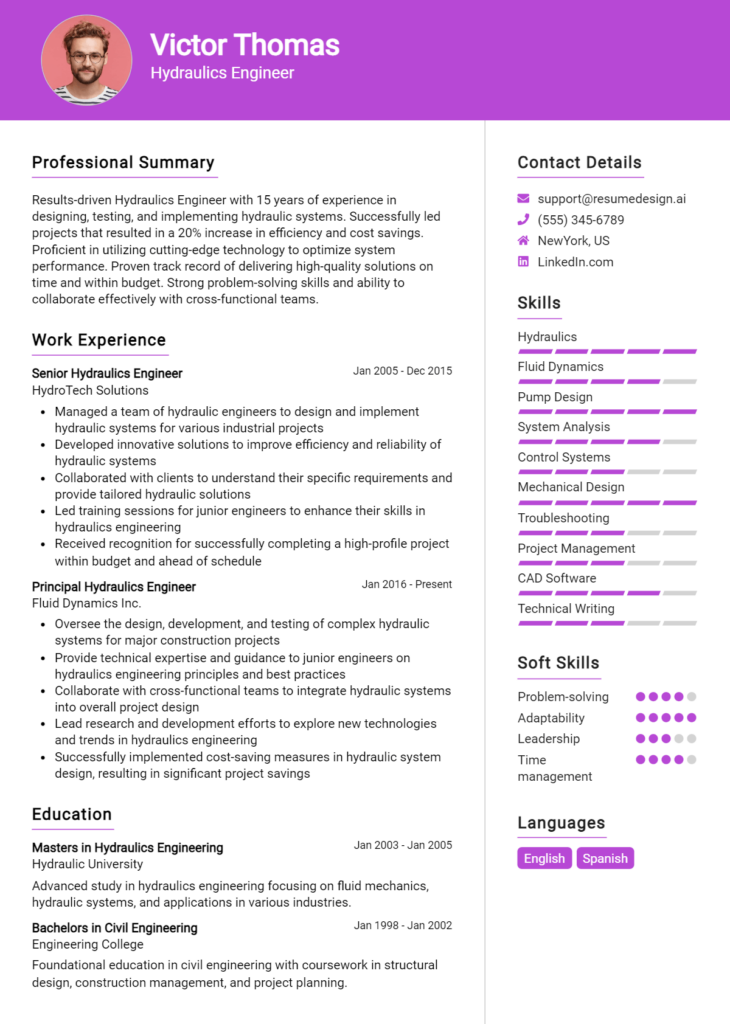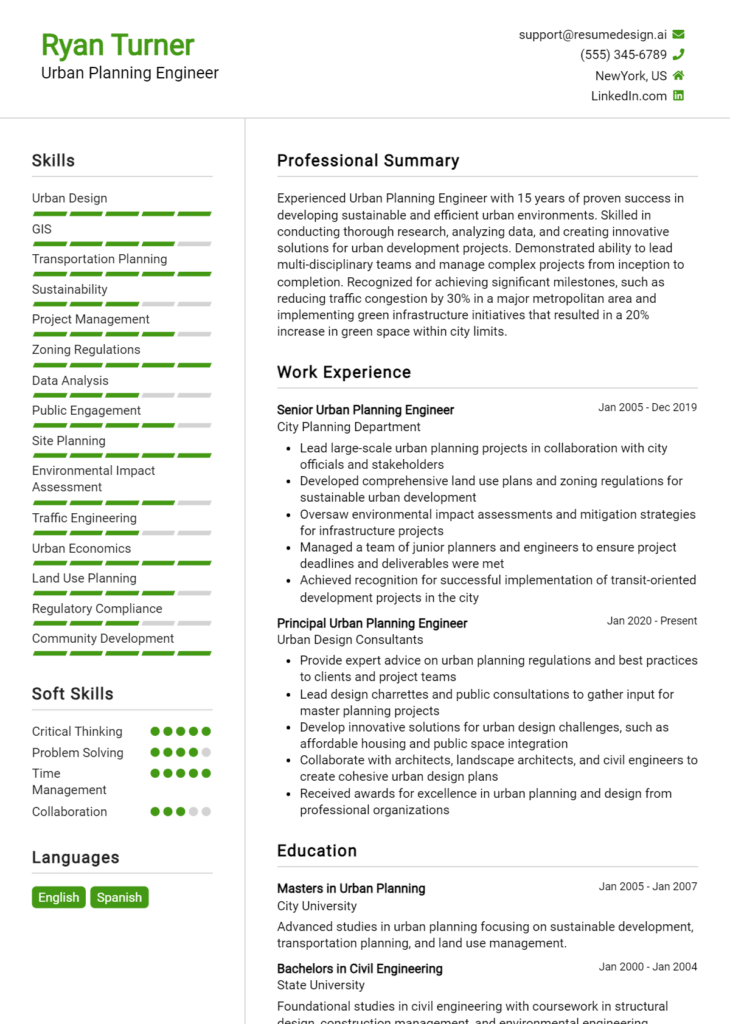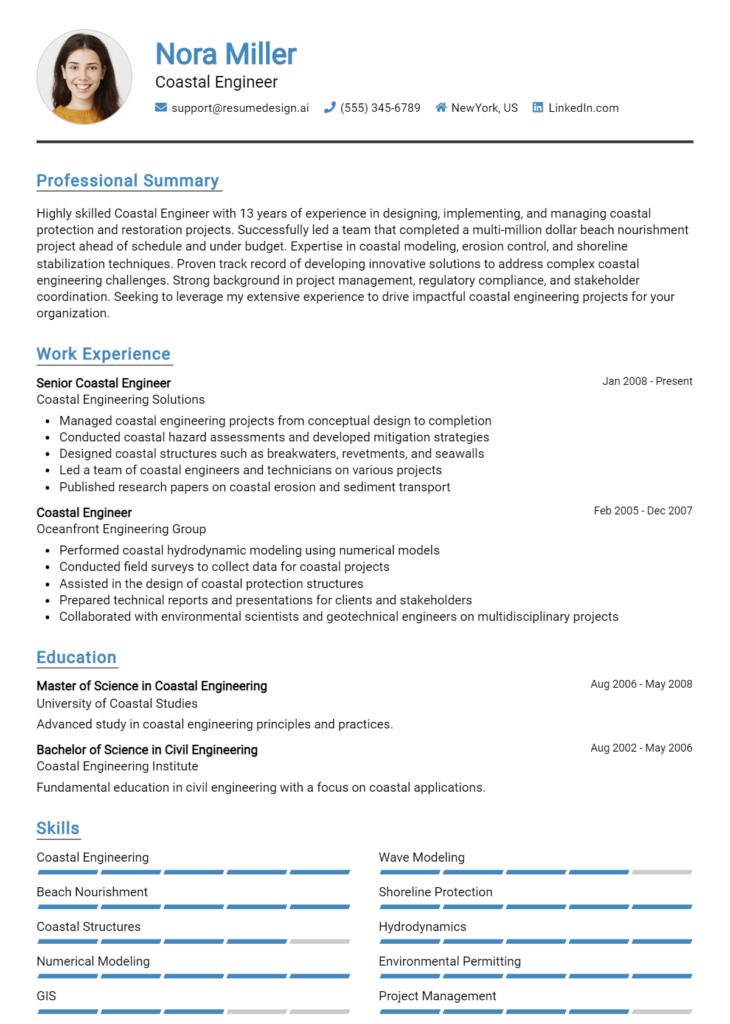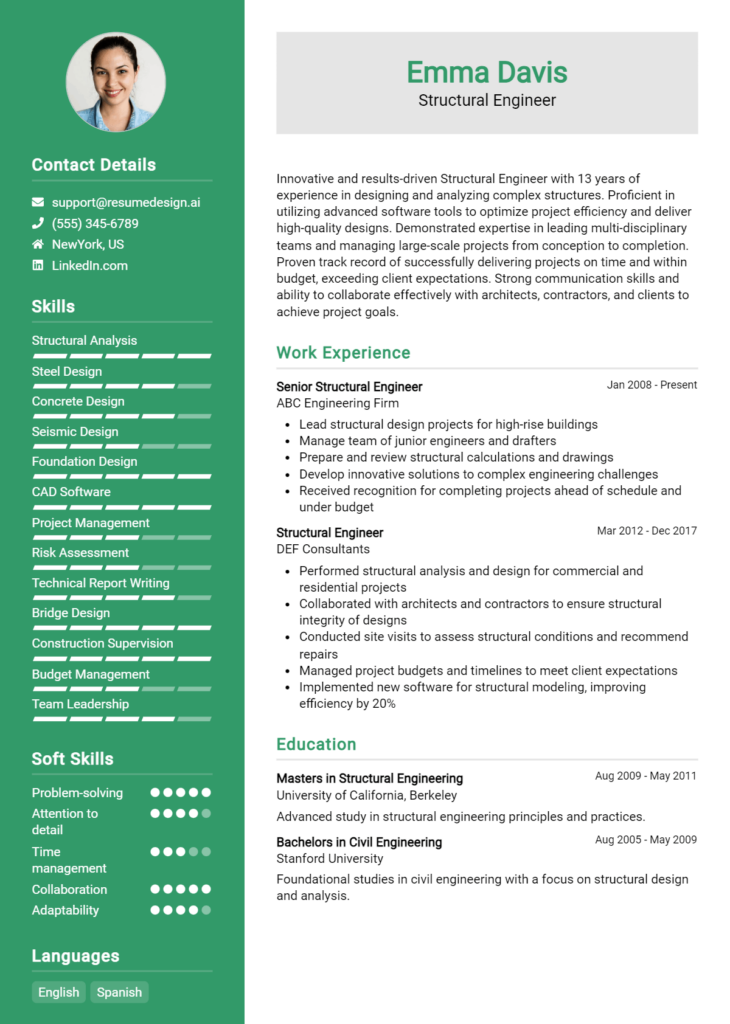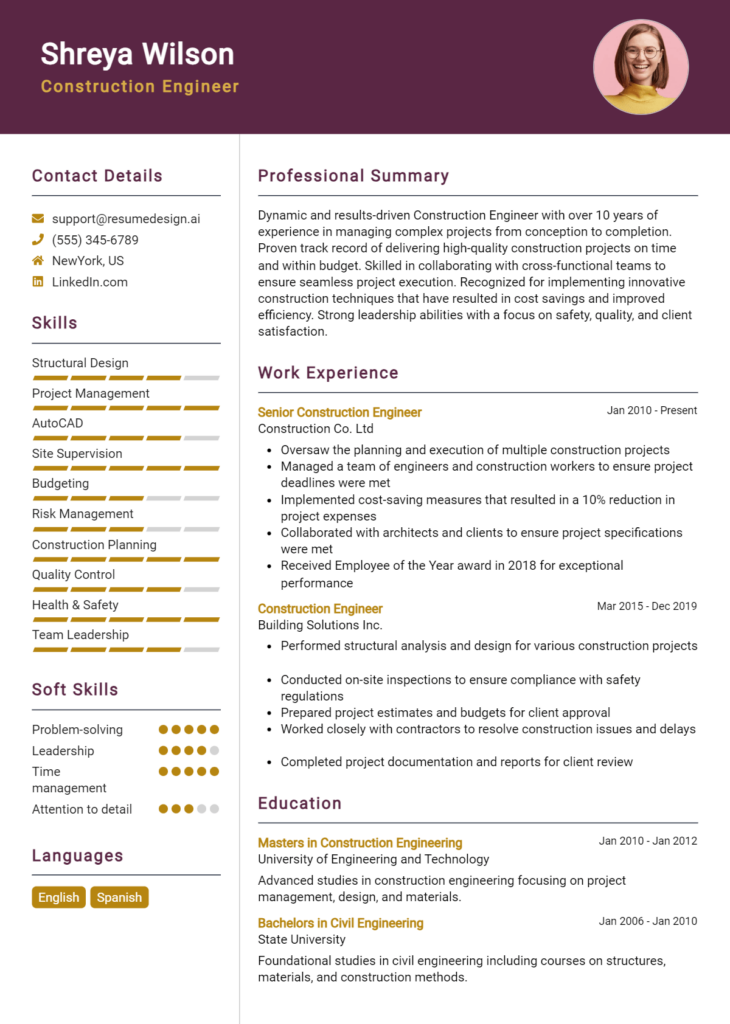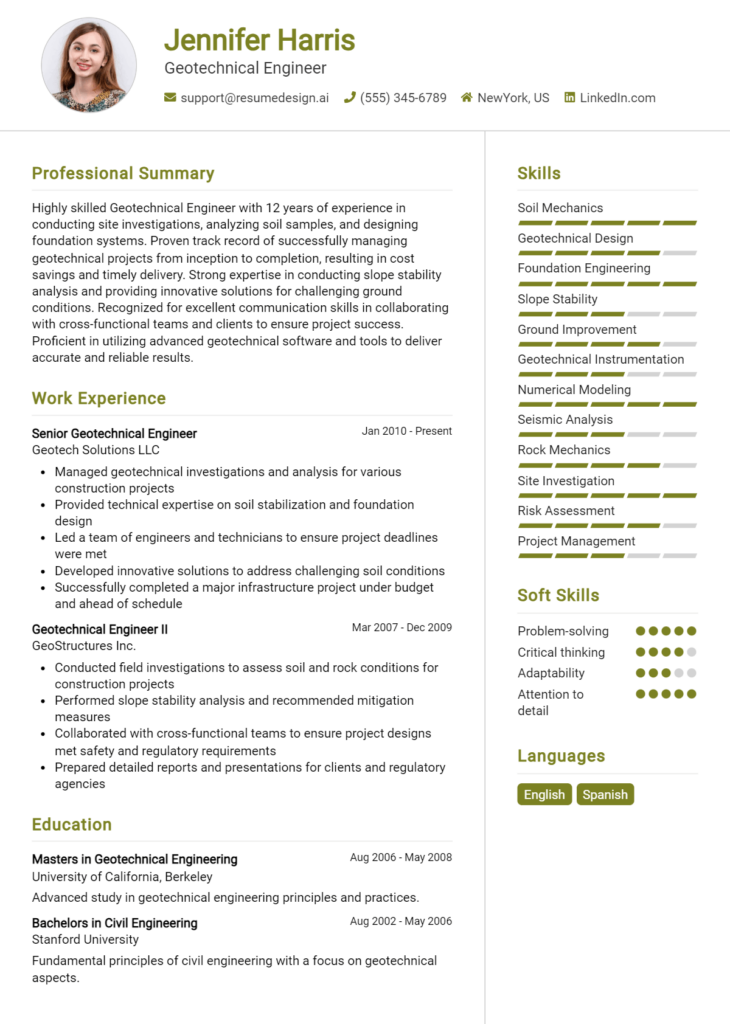Transportation Engineer Core Responsibilities
A Transportation Engineer plays a crucial role in designing, implementing, and maintaining transportation systems that ensure the safe and efficient movement of people and goods. This professional bridges various departments, requiring strong technical expertise, operational understanding, and exceptional problem-solving skills. Effective communication and collaboration with urban planners, environmental scientists, and public officials are essential for project success. Highlighting these qualifications in a well-structured resume is vital, as it demonstrates the engineer's ability to contribute to the organization’s overall goals and objectives.
Common Responsibilities Listed on Transportation Engineer Resume
- Design and analyze transportation infrastructure, including roads, bridges, and transit systems.
- Conduct traffic studies and generate reports on transportation patterns.
- Collaborate with multidisciplinary teams to ensure project compliance with regulations.
- Develop and implement traffic management plans.
- Evaluate and recommend improvements to existing transportation systems.
- Utilize advanced modeling software for traffic simulations.
- Prepare and present technical reports to stakeholders and government agencies.
- Manage project budgets and timelines effectively.
- Conduct environmental impact assessments for transportation projects.
- Provide technical support during construction and implementation phases.
- Stay updated on industry trends and advancements in transportation technology.
High-Level Resume Tips for Transportation Engineer Professionals
In the competitive field of transportation engineering, a well-crafted resume serves as your first opportunity to make a lasting impression on potential employers. This crucial document not only showcases your technical skills and educational background but also highlights your achievements and contributions to past projects. A strong resume reflects your expertise in designing, evaluating, and improving transportation systems, making it essential to present your qualifications effectively. In this guide, we will provide practical and actionable resume tips specifically tailored for Transportation Engineer professionals to help you stand out in a crowded job market.
Top Resume Tips for Transportation Engineer Professionals
- Tailor your resume to match the specific job description, using keywords from the posting to highlight relevant skills and experience.
- Begin with a strong summary statement that outlines your career goals, key competencies, and what you bring to the role.
- Showcase your relevant experience prominently, focusing on projects that align with the job you are applying for.
- Quantify your achievements with concrete data, such as project costs, time savings, or improvements in efficiency.
- Highlight industry-specific skills, such as proficiency in design software (e.g., AutoCAD, Civil 3D) and familiarity with transportation regulations.
- Include any certifications or licenses relevant to transportation engineering, such as Professional Engineer (PE) status.
- Incorporate technical language and terminology that demonstrate your expertise and familiarity with the field.
- Use a clean, professional format that makes your resume easy to read, ensuring key information is easily accessible.
- Consider adding a section for professional affiliations or memberships in engineering organizations to showcase your commitment to the profession.
- Proofread thoroughly to eliminate any errors in grammar, spelling, or punctuation, as attention to detail is crucial in engineering roles.
By implementing these tips, you can significantly increase your chances of landing a job in the transportation engineering field. A well-structured and targeted resume not only communicates your qualifications effectively but also demonstrates your commitment and professionalism, setting you apart from other candidates in the hiring process.
Why Resume Headlines & Titles are Important for Transportation Engineer
In the competitive field of transportation engineering, a resume headline or title serves as the first impression a candidate makes on hiring managers. A strong headline can instantly capture attention and convey essential qualifications in a succinct and impactful manner. It acts as a powerful summary that highlights the candidate's expertise, experience, and relevance to the job at hand. By crafting a concise and relevant headline, candidates can effectively position themselves as suitable candidates for the role, making it easier for hiring managers to recognize their potential contributions to the organization.
Best Practices for Crafting Resume Headlines for Transportation Engineer
- Keep it concise: Aim for one to two impactful phrases.
- Be role-specific: Tailor your headline to reflect the specific position you are applying for.
- Highlight key skills: Incorporate essential skills relevant to transportation engineering.
- Use action-oriented language: Choose strong verbs to convey your capabilities.
- Include relevant certifications: Mention any certifications that bolster your qualifications.
- Focus on achievements: Showcase measurable accomplishments that differentiate you from other candidates.
- Avoid jargon: Use clear and straightforward language that is easily understood by hiring managers.
Example Resume Headlines for Transportation Engineer
Strong Resume Headlines
Innovative Transportation Engineer with 10+ Years in Sustainable Infrastructure Development
Results-Driven Civil Engineer Specializing in Traffic Optimization and Safety Enhancements
Dynamic Project Manager with Proven Track Record in Large-Scale Transit Projects
Weak Resume Headlines
Engineer Looking for a Job
Transportation Expert
Strong headlines are effective because they provide clear, specific insights into the candidate's experience and expertise, making them stand out in a crowded job market. They highlight relevant achievements and skills, giving hiring managers an immediate reason to consider the candidate. In contrast, weak headlines fail to impress because they lack specificity and do not convey any unique value proposition; they come across as generic and do not engage the reader, making it easy for hiring managers to overlook these candidates.
Writing an Exceptional Transportation Engineer Resume Summary
A well-crafted resume summary is crucial for a Transportation Engineer seeking to make a strong impression on hiring managers. This concise paragraph serves as a snapshot of the candidate's key skills, relevant experience, and notable accomplishments, allowing hiring managers to quickly assess their fit for the role. A strong summary not only highlights the candidate's expertise but also aligns with the specific requirements of the job, thereby increasing the chances of landing an interview. By being impactful and tailored, the resume summary can capture attention and set the tone for the rest of the application.
Best Practices for Writing a Transportation Engineer Resume Summary
- Quantify achievements: Use numbers and metrics to showcase the impact of your work.
- Focus on relevant skills: Highlight technical skills and certifications that are pertinent to the transportation industry.
- Tailor for the job description: Customize the summary to align with the specific requirements and responsibilities outlined in the job posting.
- Keep it concise: Aim for 3-5 sentences that deliver maximum information in a brief format.
- Use action verbs: Start sentences with strong action verbs to convey a sense of proactivity and results-driven mindset.
- Highlight problem-solving abilities: Showcase instances where you successfully addressed challenges in transportation engineering projects.
- Incorporate industry-specific language: Use terminology and jargon that resonate with hiring managers in the transportation field.
- Showcase leadership and teamwork: Mention experiences that demonstrate your capability to work collaboratively or lead projects.
Example Transportation Engineer Resume Summaries
Strong Resume Summaries
Dynamic Transportation Engineer with over 8 years of experience in designing and implementing transportation systems that improve traffic flow by up to 30%. Proficient in using AutoCAD and traffic simulation software, with a track record of reducing project costs by 15% through innovative design solutions.
Results-driven Transportation Engineer skilled in project management and infrastructure planning. Successfully led a $2 million highway improvement project that enhanced safety and reduced travel time by 20%. Certified in traffic engineering and environmental management.
Detail-oriented Transportation Engineer with expertise in sustainable transportation solutions. Developed a city-wide bike lane project that increased bicycle ridership by 50% and received commendation from local government for enhancing community access.
Weak Resume Summaries
Transportation Engineer with experience in various projects. Looking for a new opportunity in the field.
Dedicated professional interested in transportation engineering. Skilled in many areas but not specific about achievements or roles.
The strong resume summaries are effective because they provide clear, quantifiable results and specific skills that directly relate to the role of a Transportation Engineer. They showcase achievements and paint a vivid picture of the candidate's capabilities. In contrast, the weak summaries lack detail and specificity, failing to communicate the candidate's impact or relevance to potential employers. As a result, they do not effectively capture the hiring manager's attention or convey the candidate's qualifications.
Work Experience Section for Transportation Engineer Resume
The work experience section of a Transportation Engineer resume is a critical component that effectively showcases the candidate's professional journey, technical skills, and leadership capabilities. This section allows potential employers to gauge the applicant's ability to manage teams, deliver high-quality projects, and implement innovative solutions within the transportation sector. By quantifying achievements and aligning experiences with industry standards, candidates can provide compelling evidence of their qualifications and readiness for the role, making this section an essential part of any successful resume.
Best Practices for Transportation Engineer Work Experience
- Highlight specific technical skills relevant to transportation engineering, such as CAD software proficiency, traffic modeling, or project management tools.
- Quantify results wherever possible, such as percentage improvements in project efficiency or cost savings achieved.
- Use action verbs to describe experiences, emphasizing leadership roles and team collaboration.
- Tailor your experiences to match the job description, ensuring alignment with the employer's needs and industry standards.
- Include details about projects, such as scope, scale, and your specific contributions to demonstrate your impact.
- Showcase problem-solving skills by describing challenges faced and the innovative solutions implemented.
- Incorporate relevant certifications or training that enhance your technical expertise and project management skills.
- Maintain clarity and conciseness to ensure that each experience is easily digestible for hiring managers.
Example Work Experiences for Transportation Engineer
Strong Experiences
- Led a multidisciplinary team in the design and implementation of a $5 million highway expansion project, resulting in a 30% reduction in traffic congestion.
- Developed a traffic management plan for a metropolitan area that decreased travel times by 15% and improved safety metrics by 25% over two years.
- Managed the successful completion of a major bridge rehabilitation project, overseeing a team of engineers and contractors, finishing 10% under budget and two weeks ahead of schedule.
- Implemented advanced modeling software to analyze traffic patterns, which informed city planning decisions and enhanced public transportation routes, leading to a 20% increase in ridership.
Weak Experiences
- Worked on various projects related to transportation engineering.
- Assisted with project management tasks and attended meetings.
- Participated in some design work for road systems.
- Helped with general engineering tasks as needed.
The examples of strong experiences are considered effective because they clearly articulate the candidate's achievements, quantify their impact, and demonstrate leadership and collaboration within their specific roles. In contrast, the weak experiences lack detail and specificity, failing to convey the candidate's skills or contributions in a way that would impress potential employers. Strong experiences provide concrete evidence of results and expertise, while weak experiences appear vague and do not highlight the candidate's capabilities.
Education and Certifications Section for Transportation Engineer Resume
The education and certifications section of a Transportation Engineer resume is pivotal in demonstrating a candidate's academic qualifications, relevant industry credentials, and commitment to lifelong learning. This section serves as a clear indicator of the candidate's preparedness for the role, showcasing not only their formal education but also any specialized training and certifications that align with transportation engineering principles and practices. By including pertinent coursework and certifications, candidates can significantly enhance their credibility, making them more attractive to potential employers who seek professionals well-versed in the latest technologies and methodologies in the field.
Best Practices for Transportation Engineer Education and Certifications
- List degrees in reverse chronological order, starting with the most recent.
- Include relevant coursework that aligns with transportation engineering principles.
- Highlight industry-recognized certifications, such as the Professional Engineer (PE) license.
- Detail any specialized training programs or workshops attended.
- Consider including GPA if it is above 3.0 and relevant to the job application.
- Use clear, concise language to describe educational accomplishments and certifications.
- Ensure all information is current and accurately reflects your qualifications.
- Tailor the section to match the specific job requirements and industry standards.
Example Education and Certifications for Transportation Engineer
Strong Examples
- Bachelor of Science in Civil Engineering, University of XYZ, Graduated May 2021
- Master of Science in Transportation Engineering, University of ABC, Expected Graduation May 2024
- Professional Engineer (PE) License, State of California, Issued June 2022
- Certificate in Traffic Engineering from the Institute of Transportation Engineers, Completed January 2023
Weak Examples
- Bachelor of Arts in English Literature, University of ABC, Graduated May 2019
- Certification in Project Management (not focused on engineering), Issued February 2020
- High School Diploma, Graduated June 2015
- Basic First Aid Certification, Completed March 2022
The strong examples presented above are considered effective because they are directly relevant to the transportation engineering field, showcasing degrees and certifications that highlight the candidate's specialized knowledge and skills. In contrast, the weak examples lack relevance to the profession or are outdated, indicating a misalignment with the qualifications necessary for a Transportation Engineer role. Including pertinent and current educational credentials is essential for establishing credibility and demonstrating preparedness for the job.
Top Skills & Keywords for Transportation Engineer Resume
In the competitive field of transportation engineering, showcasing the right skills on your resume is crucial for standing out to potential employers. A well-crafted resume not only highlights your technical expertise but also emphasizes your ability to collaborate, communicate, and solve complex problems. By effectively presenting both hard and soft skills, you can demonstrate your qualifications and readiness to tackle the challenges of this critical profession. Employers often seek candidates who not only have a solid foundation in engineering principles but also possess interpersonal and organizational abilities that contribute to successful project outcomes.
Top Hard & Soft Skills for Transportation Engineer
Soft Skills
- Communication
- Team Collaboration
- Problem-Solving
- Critical Thinking
- Time Management
- Adaptability
- Attention to Detail
- Leadership
- Negotiation
- Conflict Resolution
- Project Management
- Analytical Thinking
- Creativity
- Empathy
Hard Skills
- Civil Engineering Principles
- Transportation Modeling Software (e.g., VISSIM, HCS)
- Traffic Analysis
- Geometric Design
- Roadway Design
- AutoCAD and Civil 3D
- Project Management Software (e.g., MS Project)
- GIS (Geographic Information Systems) Proficiency
- Environmental Impact Assessment
- Pavement Design
- Structural Analysis
- Safety Analysis
- Regulatory Compliance Knowledge
- Cost Estimation Techniques
- Data Analysis and Interpretation
For more insights on how to enhance your resume with the right skills and showcase relevant work experience, consider tailoring your application to reflect the competencies that align with the job requirements in the transportation engineering field.
Stand Out with a Winning Transportation Engineer Cover Letter
Dear Hiring Manager,
I am writing to express my interest in the Transportation Engineer position at [Company Name] as advertised on [Job Board/Company Website]. With a solid foundation in civil engineering and over [X years] of hands-on experience in transportation planning and design, I am excited about the opportunity to contribute to your team. My background includes successful project management and the implementation of innovative transportation solutions that enhance safety, efficiency, and sustainability.
In my previous role at [Previous Company Name], I led a multidisciplinary team in the design and evaluation of several major transportation projects, including [specific projects or initiatives]. My expertise in using advanced modeling software, such as AutoCAD and VISSIM, allowed me to create effective transportation models that optimized traffic flow and reduced congestion. I am particularly proud of my work on [specific achievement], which resulted in a [quantifiable outcome, e.g., a percentage reduction in traffic delays or improved safety ratings].
I am passionate about integrating modern technology and sustainable practices into transportation systems. My recent involvement in [specific initiative or technology, e.g., smart traffic signals or green infrastructure] has equipped me with the knowledge to advance innovative approaches in transportation engineering. I am eager to bring this forward-thinking mindset to [Company Name] and collaborate with your talented team to develop solutions that meet the evolving needs of our communities.
Thank you for considering my application. I am excited about the possibility of contributing to [Company Name] and look forward to the opportunity to discuss how my experience and vision align with your organization's goals. I am available at your earliest convenience for an interview and can be reached at [Your Phone Number] or [Your Email Address].
Sincerely,
[Your Name]
Common Mistakes to Avoid in a Transportation Engineer Resume
When crafting a resume as a Transportation Engineer, it's crucial to avoid common pitfalls that can detract from your qualifications and experience. A well-structured resume not only showcases your technical skills and project experience but also reflects your attention to detail and professionalism—qualities that are vital in the engineering field. Below are some common mistakes to watch out for when preparing your resume:
Using a Generic Template: Many candidates opt for standard templates that do not highlight their unique experiences or skills. Customizing your resume to reflect your specific background in transportation engineering can make a significant impact.
Neglecting Relevant Keywords: Failing to include industry-specific keywords can lead to your resume being overlooked by applicant tracking systems. Research job postings to identify key terms and incorporate them into your resume.
Lack of Quantifiable Achievements: Simply listing job duties without quantifying your achievements can diminish your impact. Use metrics to demonstrate your contributions, such as "Improved traffic flow by 20% through optimized signal timing."
Overloading with Technical Jargon: While technical skills are essential, using excessive jargon may alienate hiring managers who may not be familiar with all the terminology. Aim for clarity and balance between technical language and general understanding.
Ignoring Soft Skills: Technical expertise is important, but soft skills such as communication, teamwork, and problem-solving are equally valuable. Highlight these skills to demonstrate your ability to work effectively in collaborative environments.
Inconsistent Formatting: A resume that lacks consistent formatting can appear unprofessional and distract from your qualifications. Ensure uniformity in font sizes, bullet points, and spacing throughout the document.
Lengthy Descriptions: Providing lengthy descriptions for each role can overwhelm the reader. Aim for concise, impactful statements that clearly convey your responsibilities and achievements.
Failing to Tailor for Each Application: Sending the same resume for multiple job applications can lead to missed opportunities. Tailor your resume to align with the specific requirements and preferences of each employer.
Conclusion
As we conclude our exploration of the Transportation Engineer role, it's essential to reflect on the skills and qualifications that set successful candidates apart. We discussed the importance of technical knowledge in traffic engineering, transportation planning, and civil engineering principles. Additionally, effective communication skills, project management experience, and proficiency in relevant software tools were highlighted as critical components of a strong Transportation Engineer profile.
To position yourself as a competitive candidate in this field, it's crucial to ensure that your resume accurately reflects your expertise and accomplishments. We encourage you to take the time to review and enhance your Transportation Engineer resume. Consider utilizing available resources like resume templates, which can provide a professional layout tailored for your industry.
Additionally, a resume builder can streamline the creation process, allowing you to focus on showcasing your skills and experiences effectively. Don’t forget to check out resume examples for inspiration and best practices. Lastly, a cover letter template can help you craft a compelling introduction to your application.
Take action now to refine your resume and increase your chances of landing that ideal Transportation Engineer position!

